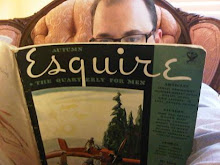As I have stated in an earlier blog post, and as anyone who knows me will attest, I am a voracious consumer of periodicals. My Esquire habit is legendary. I have maintained long-term relationships with a host of other magazines. I enjoy sitting down to the Sunday paper printed on actual paper. I never met a newsstand I didn't like. And now, as the Internet progresses through its second decade as a mainstream media outlet while the American economy grinds down on consumers, advertisers and publishers, the roster of periodicals is shrinking at an alarming pace with some venerable names among the casualties. Last week, my postal carrier delivered the final edition of Gourmet. Over the past month much has been made of the demise of the grande dame of culinary periodicals. One of the more recent articles on the subject can be found here http://www.pbs.org/mediashift/2009/10/did-the-web-kill-gourmet-magazine299.html#comment-161299.
The author makes a number of very valid points regarding Gourmet's dwindling utility – more home epicures are downloading recipes straight from the net, printing them out for use or even bringing their laptops directly to the counter; the recipes themselves were not practical for more austere times and tastes, the net provides multiple opportunities to seek advice and information from specialists within narrow culinary fields; the companion website(s) didn't fulfill the consumers' social media needs as well as other sites. I don't disagree with any of these points. Apparently Conde Nast didn't have any answer for them either, ergo, “au revoir Gourmet.” But I don't believe that Gourmet's fate should be viewed as a sign that print magazines are best consigned to the recycling bin of history.
I am adapting to the digital age. I have the Times Reader installed on my laptops. I read any number of other periodicals that have taken the time and energy to create Blackberry-legible sites. I have flirted with the notion of owning a Kindle, Nook or whatever Plastic Logic decides to name their e-reader. I readily admit that the delivery of information is greatly enhanced by many of the features available on Web 2.0. Hyperlinks, embedded video, RSS, sharing via social media are all, to borrow a term from my 80's post-adolescence, awesome. They bring a vividness to the consumer that classical print media will never be able to replicate. However, electronic media's imminently more environmentally friendly and efficient consumer experience, is also the source of one of my biggest problems with it. When it's off your screen, there's no telling whether it will ever be seen again. Sure, a number of sites archive their materials, but it's just not the same as being able to look back at an old magazine (for those like me who happen to have separation issues with their back issues) where you always know the article is going to be there.
And then there's the issue of the ads. So long as web-based publications remain (largely) free to the consumer, there will be ads. But these ads are generally designed to be portals – eye-catchers intended to entice the consumer to click through to the advertiser's main site. Magazine ads are forced to make their entire sales pitch on the page, leaving little for the consumer to do other than invest a few seconds perusing whatever the message happens to be. Therefore, these ads are reasonably calculated to capture the consumer based upon what the advertiser (and the good folks at Sterling Cooper or whomever has their account) believe is important and engaging at that particular moment in time. Accordingly, print ads are like snapshots of society and magazines the shoebox in the closet that holds them all, even if it's only dragged out at Thanksgiving.
Can print media be minimized? Certainly. There are many areas of opportunity for information to be dispensed in a more efficient, enviro-friendly manner. Does this warrant a clarion call for the entire print media industry to move toward a digital format? Absolutely not. Magazines and other forms of print media are too valuable a history-freezing asset to discard in their entirety. The challenge, of course, is to preserve certain forms of print media in such a way as to justify the expense of production as well as the value to the consumer who may be forced to pay a significantly higher premium (no more $8 annual subscription rates for a magazine that retails for $4.95 an issue at the newsstand) for the privilege of portable media that doesn't require a battery or an Internet connection. Magazines are windows (note the lower case “w”) unto society which, like any other classic architectural element, deserve some degree of preservation as technology paves the way for new and more sophisticated structures.
Tuesday, October 27, 2009
Subscribe to:
Post Comments (Atom)

Thanks very much for your comments on the Midwestyle, Yale. We love connecting with other Mizzou alums. And as a magazine journalism grad with an Esquire subscription myself, I'm glad to hear you're fighting the good fight.
ReplyDeleteCheers!